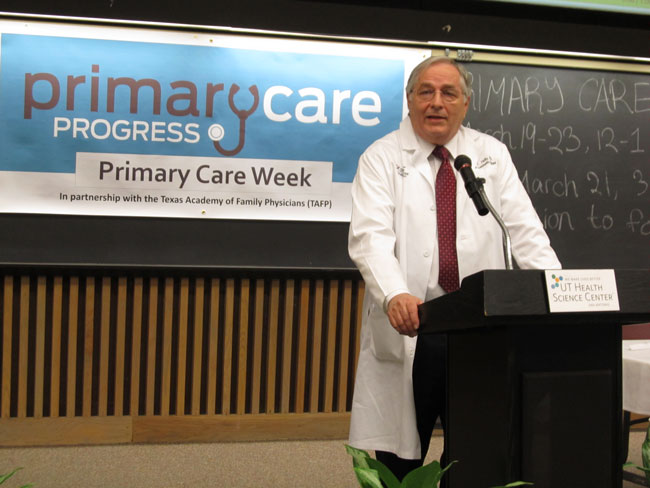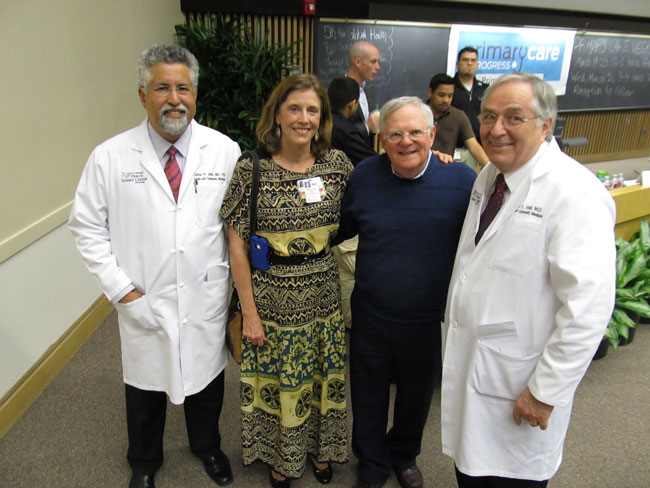|
Posted: Thursday, April 05, 2012 · Volume: XLV · Issue: 7

| |
| "There has never been a better time to go into primary care," said James L. Holly, M.D., the invited keynote lecturer of Primary Care Week at the UT Health Science Center. |
|
By Will Sansom
SAN ANTONIO (March 30, 2012) —
Each patient has a race to win, a marathon lasting 8,760 hours, the span of a year. To each patient a primary care physician relays a baton — advice such as "walk daily" — and it's up to each patient to carry that baton to victory.
Some patients take the baton and toss it casually to the side. Others forcefully hurl it as far away as possible. A few carry it in stride, making the changes necessary for healthy living.
School of Medicine graduate James L. Holly, M.D., of Southeast Texas Medical Associates (SETMA) in Beaumont, believes the secret to successfully passing the baton is to get closer to patients — to learn their stories and hopes, their dreams and goals, and building on this to help them understand the race they must win.
Dr. Holly, a 1973 graduate, delivered the keynote address of Primary Care Week, a March event coordinated and energized by students in the School of Medicine, School of Nursing and School of Health Professions.

|
|
| Invited keynote speaker James L. Holly, M.D., (far right) visits before the Primary Care Week lecture with (left to right) Carlos Roberto Jaén, M.D., Ph.D., FAAFP, professor and chair of family and community medicine in the School of Medicine; Barbara J. Turner, M.D., M.S.Ed., M.A., FACP, professor of medicine and director of the Research to Advance Community Health (ReACH) Center; and Jerald Winakur, M.D., FACP, CMD, clinical professor of medicine and a faculty member of the Center for Medical Humanities & Ethics. |
|
| |
Learning patients' stories lead to roadmaps for good health
Primary care is a "specialty of people," Dr. Holly said. "Their stories are the most valuable things we've got." Technology may be glitzy, but in the end primary care physicians must become involved with patients because they love them and want to serve them, he said.
The concept of the medical home, which SETMA exemplifies, is to get close to patients, establishing trust and positively impacting their care. SETMA partners provide $500,000 annually to the non-profit SETMA Foundation to pay for patients who can't pay for themselves. This enables SETMA physicians to care for a wider group of patients.
Giving patients hope
Dr. Holly related the stories of several patients, including a man who was concerned he would lose his care at SETMA and have nowhere else to turn. Dr. Holly told the man he would not be let go by the practice. "He has a medical home. I told him he will have care as long as SETMA is not bankrupt. He now has hope," Dr. Holly said.
Caring about people results in a transformation of their health care so that they grasp the baton and understand. Patient-centered medical homes give people dignity and respect, Dr. Holly said.
Electronic medical records point the way
Dr. Holly touched on several other topics for the students, including the effectiveness and efficiency that electronic medical record (EMR) systems bring to primary care. Evidence of outcomes — hundreds of which are reported on SETMA's website — increases patients' confidence in the care they receive.
There is an information explosion in medicine. "You can't learn it all. You can't know it all," Dr. Holly said. "What we need is to understand dynamic complexity, to see how things are interrelated.
"
The EMR in medical practice makes complex tasks simple. For example, SETMA's EMR can calculate an array of cardiovascular scenarios — called the Framingham heart age — in a single second.
Quality metrics are like the GPS tracking system of primary care, Dr. Holly said. "If you improve one quality metric, you won't change the quality of care for a patient, but if you change nine, you will," he said.
Primary Care Week
Primary Care Week represented the efforts of many medical, nursing and physician assistant student organizers and faculty contributors, said Jerry Abraham, M.P.H., a second-year medical student. Goals included encouraging more students to enter primary care, stimulating dialogue among primary care providers and fostering research in the field.
Primary Care Institute initiated at the Health Science Center
Dr. Holly announced a $25,000 gift from the SETMA Foundation and a $25,000 personal gift from him and his wife, Carolyn, to initiate a Primary Care Institute at the UT Health Science Center.
|